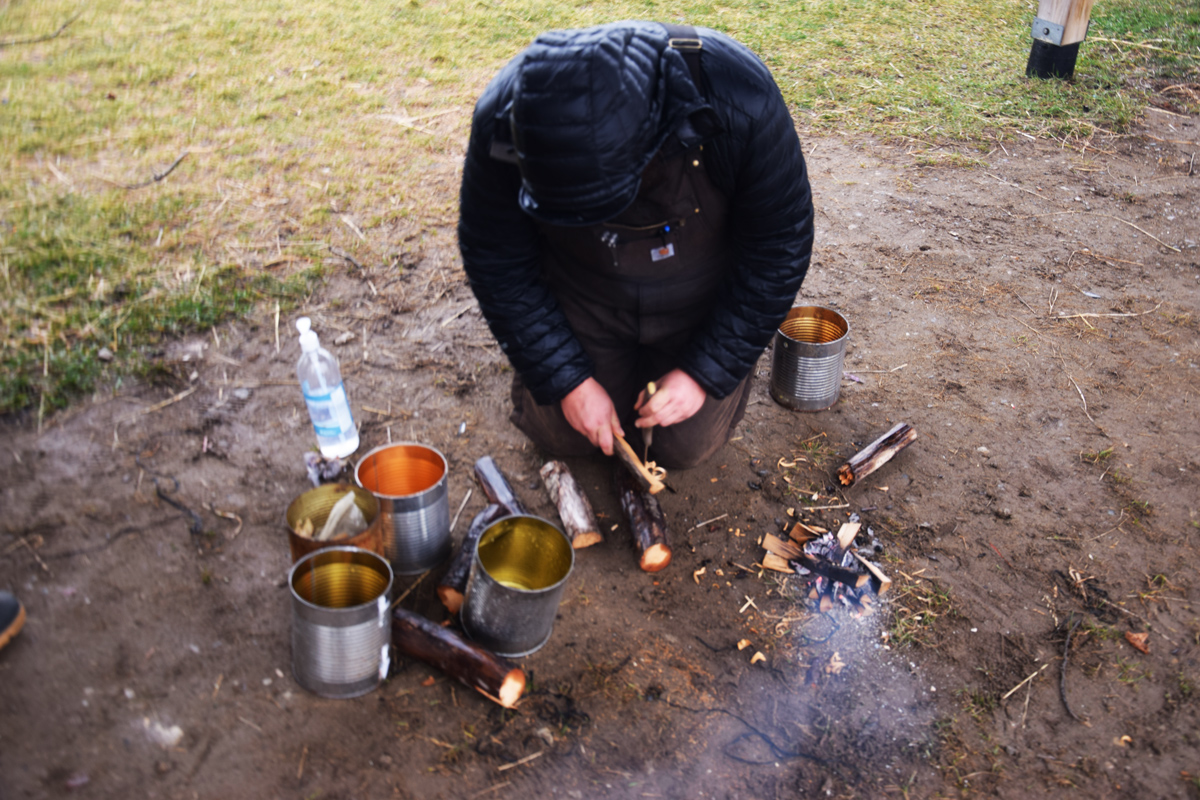WIIKWEMKOONG—Life can be precarious. All it takes to shake us out of the complacency of our modern-day comforts is one of Mother Nature’s rolls of the weather dice. One major ice storm can upset all the best laid plans of Hydro One’s diligent crews, overwhelming their ability to maintain the grid and keep the electricity flowing. North America saw such an event in January 1998 when a combination of five smaller ice storms struck in succession to knock out power in Ontario and Quebec for a significant amount of time—plunging homes into darkness for weeks and even months. What can be an annoying inconvenience in the warmer seasons can quickly become a fight for survival when old Jack Frost comes calling.
Nimkii Lavell, your land-based pall, and Nathan Bryant, ‘Nature Nate,’ were among those on hand ready to impart basic survival skills to those attending the land-based learning event held at Thunderbird Park (Nimkii Bineshii) on Saturday, December 9 from 10 am to 2 pm.
The day could hardly have been more appropriate for learning land-based survival skills and medicines as rain and wind provided ample reminders of what Mother Nature can have up her sleeve, emphasizing the need to immediately find shelter when caught outside at this time of year. Luckily, a nearby tipi was set up complete with fire, hot chocolate, coffee and tea as a warming station. Outside, chili and scone, hotdogs and buns were in ample supply as well.
Nature Nate was busy showing people how to start a fire and secure dry wood when it is raining. “Always have a good knife if you are in the bush,” he cautioned, it can be a vital survival tool when the chips are down—in fact, it is great for making chips, curls of wood, for starting a fire and for splitting pieces of wood open to get at the dry firewood inside. “If you don’t have a knife then you have to look around for rocks and things, be creative,” he suggests.
Both Mr. Bryant and Mr. Lavell work for the Wiikemkoong Board of Education and can often be found shepherding their charges through the bush and on the water imparting traditional land-based learning and skills through practical application.
Mr. Lavell and Mr. Bryant provided practical “tips and tricks” for dealing with what Mother Nature can throw your way—especially if it looks like a 1998 repeat. With the advent of climate change, the only thing that can be predicted about the weather is that it will often be unpredictable.

“When the power goes out do not use your toilet,” advised Mr. Lavell. “The tank can be a source of clean water. There is a water tower here in Wiiky, but the pressure won’t last forever. There might be backup generators, but who knows how long the gas will hold out? Don’t open your fridge and stand and stare at it, do a mental inventory of what is inside and only open it when you have to get something out.”
Other tips include cutting down your living space by hanging blankets and closing off doors to conserve heat. “We used to live in small log cabins, sometimes 12 in a single room,” he noted. Escaping body heat can help conserve the heat in those smaller spaces.
At another station, Francis Mandamin and friends such as Wiikwemkoong Heritage Organization language keeper Stanley Peltier were offering up lessons in creating traditional cough medicine.
Ms. Mandamin had samples of the 10 ingredients that are boiled for several hours to make the medicine, all but the mullein of which are evergreen plants (or tamarack) that can be harvested year-round. “You have to harvest the mullein in the summer as the plants go to sleep in the winter and can be much harder to find,” she suggested.
Accompanying the ingredient samples were photos of the trees and plants from which they are harvested. As an added teaching tool, Ms. Mandamin had written the names of each on the back of the photo in Anishinaabemowin.
A key ingredient is honey, an addition that certainly helps the medicine go down as, much like another effective but “store-bought” cough remedy, the unsweetened brew is a bit on the bitter side. The Expositor can attest to that though thanks to a sample provided by Ms. Mandamin.
Ms. Mandamin said that the recipe for the traditional medicine came from an elder who lives near Blind River.
“We have the knowledge from our ancestors,” said Mr. Lavell. “We just need to share it and practice it and we will be prepared for just about anything.”
“This is knowledge that is for everyone,” agreed Ms. Mandamin.